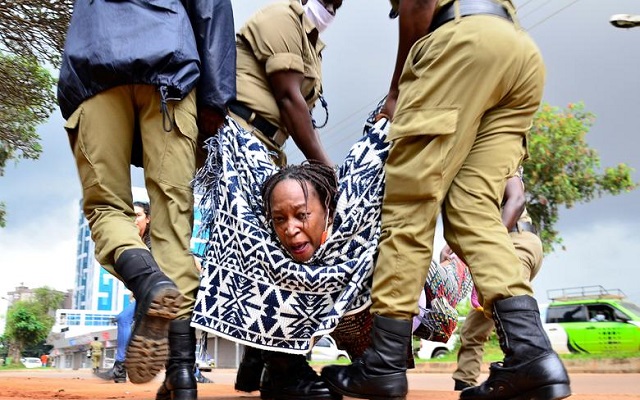
Constitutional Court boosts challenge of Nsereko amendments of Computer Misuse Act
Kampala, Uganda | MUBATSI ASINJA HABATI | When former Makerere University Research Fellow Stella Nyanzi was in April 2017 picked by security agents from a fundraising function at Mackinnon Suites Hotel in Kampala, her case provoked heated debate locally and internationally. Many people felt that Nyanzi’s utterances about President Yoweri Museveni were vulgar. But the main issue was whether what she had done amounted to a crime or not.
Nyanzi spent 33-days in detention but this case has not been concluded by the courts because the prosecutors wanted Nyanzi to be examined for mental health and she protested.
In another case, Nyanzi was arraigned in court over alleged cyber harassment of President Museveni and his wife, First Lady Janet Museveni and of using offensive communication in various posts on her Facebook page.
In a specific case, she was accused of posting an alleged vulgar poem on her Facebook page on September 16, 2018 to mark President Museveni’s birthday.
Nyanzi’s accusers said the language that she used was vulgar and aimed to ridicule the President and his late mother, and that it violated the Presidents’ right to privacy which are crimes of cyber harassment under sections 24(1) and 24(2)(a) of the Computer Misuse Act.
The question for many was whether publishing a poem, or any communication for that matter, should amount to a crime.
Several months after her arrest and detention, she was in August 2019 found guilty of the crime of cyber bullying and acquitted of the crime of offensive communication. Court ruled that prosecution failed to prove how President Museveni was annoyed.
According to Section 25 of the Computer Misuse Act 2011 on offensive communication: “Any person who willfully and repeatedly uses electronic communication to disturb or attempts to disturb the peace, quiet or right of privacy of any person with no purpose of legitimate communication whether or not a conversation ensues, commits a misdemeanour and is liable on conviction to a fine not exceeding twenty-four currency points (Shs480,000 – Editor) or imprisonment not exceeding one year or both.”
Nyanzi became the first person to be convicted under the Computer Misuse Act which had come into law in 2011. She was sentenced to 18-months in jail. She appealed the sentence in the High Court and was on February 20, 2020 acquitted and set free.
In another prominent case, Rukirabashaija Kakwenza; a satirical novelist, was in December 2021 arrested on the same charge as Nyanzi – offensive communication. Kakwenza who was in 2020 named the International Writer of Courage by PEN, was held under the Computer Misuse Act.
This was the third time Kakwenza, author of `The Greedy Barbarian” was being arrested. He was first arrested in April 2020 and then in September. In all incidents, he was allegedly tortured and eventually fled into exile to Germany.
“I’m glad to be released. But why was I in prison for more than one year? I want to know why the lower courts in Uganda are abusing rights and freedoms that are constitutionally provided for,” Nyanzi said upon her release.
The question lingers and last year, in September, four people who were charged with the same crime as Nyanzi – offensive communication.
Businessman Francis Matovu, opposition National Unity Platform (NUP) Secretary for Mobilization in Eastern Uganda Moses Bigirwa, and journalists Pidson Kareire and Moses Mugalula in November 2021 allegedly used electronic communication on Whatsapp to disturb the peace and privacy of Anita Among who was then the Deputy Speaker of Parliament.
They allegedly wrote: Museveni to remove Deputy Speaker Anita Among over Corruption, Anita Among in trouble over intelligence which includes bribes from Roko Construction, bribe from Kingdom property deal and using Internal Security Organization-ISO to con and ransom investors, conning Indians of USD 400k.
Their accusers say Anita Among, who is now Speaker of Parliament, found the communications “offensive in nature”. The question is whether writing something that someone finds “offensive in nature” should be a crime.
Constitution court rules
The justices of the Constitutional Court say it should not be a crime. In another milestone decision on Jan.10, the justices gave civil rights activists a New Year gift by striking Section 25 of Computer Misuse Act off the laws of Uganda.

The Court agreed with the petitioners that this section infringes on the digital freedom of expression and is inconsistent with Article 29(1) of the 1995 Constitution of Uganda.
In a unanimous decision, the five Justices of the Constitutional Court; Richard Buteera, Kenneth Kakuru, Geoffrey Kiryabwire, Elizabeth Musoke, and Monica Mugenyi, ruled that the section on offensive communication is inconsistent with Article 29 (1) of the Constitution and ruled that it should be scrapped off for being vague and overly broad to define the actual offence committed.
The ruling stems from a petition filed by City Lawyer Andrew Karamagi and Robert Shaka in 2016 arguing that the section contravenes Article 29 of the constitution, which is the supreme law of Uganda that protects freedom of conscience, expression, movement, religion, assembly, and association.
This section which criminalised “offensive communication” stated that: “Any person who willfully and repeatedly uses electronic communication to disturb or attempts to disturb the peace, quiet or right of privacy of any person with no purpose of legitimate communication
whether or not a conversation ensues commits a misdemeanor and is liable on conviction to a fine not exceeding twenty four currency points or imprisonment not exceeding one year or both.”
Court also ruled that the section “curtails inherent freedoms of speech and expression that are guaranteed in the Constitution.” The court ordered that enforcement of Section 25 be stopped.
Many freedom of expression supporters have hailed the judgement.
The Committee to Protect Journalists said in a statement that: “The Ugandan constitutional court’s decision to nullify provisions of a law criminalising ‘offensive communication’ is a great relief, as authorities have repeatedly used this legal tool as a cudgel against critical journalism and commentary.”
Muthoki Mumo, CPJ’s sub-Saharan Africa representative said, the “Authorities must reform other problematic sections of the Computer Misuse Act that could be used to criminalise the work of the press and ensure that all of the country’s laws are compatible with the standards of freedom of speech in a democratic society.”
The petitioners contended that this section is an insidious form of censorship that restricts the free flow of opinions and ideas essential to sustain the collective life of the citizenry in the digital age, it is vague and overly broad. They also argued that there is no evidence that government could not achieve the intended purpose with less drastic measures.
They asked the court to direct the office of the Directorate of Public Prosecution-DPP to stay the prosecution of all and any citizens currently on trial for violating the “impugned rule and an order staying the enforcement of the Section in question or similar provisions of the law, which disproportionately curtail the enjoyment of the freedom of speech and expression by citizens and also direct the government to pay costs of the suit.
The panel led by Deputy Chief Justice Richard Buteera further ruled that it would be unjustified to maintain this section of the Act in a free and Democratic society when Uganda covenanted to International treaties on freedoms and people’s rights.
Reacting to the ruling, Kampala city lawyer Eron Kizza said: “I am very happy that the constitutional court unanimously agreed that law was unconstitutional, illegal, and ambiguous and therefore had to go because it hinders freedom of expression as it is written in section 29 of the constitution.”
Kiiza, who represented the petitioners argued that the section in question is a matter of constitutional interpretation and that it contravenes section 29 of the Supreme Law. He argued that the provision criminalizes communication, yet it is vague, overly broad, and ambiguous as it does not give a fair warning regarding conduct that is deemed illegal under the right and freedom of speech and expression provided for under Article 29 (1) (a) of the Constitution.
He said the section creates an offense and punishment without precisely defining key terms and phrases like “disturbing the peace, quiet, and privacy of anyone” and “with no purpose of legitimate communication”.
“The terms are broad and vague because there are no attempts to define them and cannot be defined. The result is that innocent persons are roped together with those who are not,” argued Kiiza adding that the section is unnecessary, unjustifiable, and disproportionate restrictions to the freedom of expression and speech.
The government, represented by the Attorney General denied the allegations in the petition and described it as misconceived.
Justice Kenneth Kakuru who wrote the main judgment agreed with the petitioners that the petition raises an issue for constitutional interpretation and that the section infringes on the freedoms provided for under article 29 of the constitution.
“In a democratic and free society, prosecuting people for the content of their communication is a violation of what falls within guarantees of freedom of expression in a democratic society,” he ruled.
The justice referred to General Comment 34 of the United Nations Human Rights Committee, which stated that any limitation on freedom of expression must be absolutely necessary.
He noted, the UN special rapporteur on freedom of expression stated that UN member states are only permitted to prohibit such limitation through criminal sanction only for four types of expression under international law; child pornography, direct public incitement to genocide, advocacy of national, racial, religious hatred that constitutes incitement to discrimination, hostility or violence and Incitement to terrorism.
“I find that the impugned section is unjustifiable as it curtails the freedom of speech in a free and democratic society. Secondly, section 25 of the Computer Misuse Act No.2 of 2011 does not specify what conduct constitutes offensive communication. To that extent, it does not afford sufficient guidance for legal debate,” ruled Justice Kakuru

Lawyer Isaac Ssemakadde says the Constitutional Court has maintained the internationally recognised objective test for assessing permissible and impermissible expression as stated in the 2004 apex case of Charles Onyango-Obbo and Andrew Mwenda Vs. Attorney General.
Court proceeded to award costs to the two petitioners; human rights activists Andrew Karamagi and Robert Shaka.
The Uganda Law Society welcomed this constitutional court ruling and cautioned the legislators against passing laws that are inconsistent with the constitution
The Nsereko amendments
The police and DPP have often been quick to arrest and slap charges of offensive communication on critiques of the government who have been vocal on social media sites.
Politicians who are facing criticism from the populace too have often hidden under some sections of this law to dodge accountability. Just last year, Kampala MP Muhammed Nsereko pushed through parliament a Bill that has several amendments to the Computer Misuse Act that are being challenged in court by the Uganda Law Society.
The amendment to the Computer Misuse Act, signed into law by President Museveni in October, had been criticised by Amnesty International, which has called for the “draconian” legislation to be scrapped.
In October last year, a group of 13 journalists and lawyers petitioned the Constitutional Court to nullify the so-called Nsereko amendments in the Computer Misuse Act on grounds that they are illegal and violate the freedom of expression. They sued the Attorney General through their lawyers Peter Arinaitwe and Company Advocates.
Their suit stems from the decision taken on September 8, 2022 by the Parliament to pass the Computer Misuse (Amendment Act), 2022 which was subsequently assented to by the President on October 13, 2022.
The Nsereko amendments make it a crime to write, send or share hateful, unsolicited, misleading, or malicious information online. The law also criminalises the use of photos on social media without the express permission of the owners and the sharing information which is likely to degrade or ridicule another person, group of persons, tribe, religion, ethnicity, or gender, and children without the consent of their parents or guardians. It also criminalises recording another person’s voice or video without their consent and unauthorized access to personal information.
The petitioners argue that the said law is overly broad, imprecise, and unjustifiably limit the freedom of expression, access to information, and the practice of journalism as a lawful occupation, trade or business.
The petitioners led by Tumuhimbise, the Executive Director of Alternative Digitalk, want the court to declare sections of the of the Computer Misuse Act as amended to be in contravention of constitutional rights to fair hearing, freedom of expression right to access information among others. The Constitutional Court is yet to decide on this case.
 The Independent Uganda: You get the Truth we Pay the Price
The Independent Uganda: You get the Truth we Pay the Price




Fortunately, there is a new AI bot that can write the content fo website, and it’s fully optimized to increase your ranking as well.
You can see the magic of AI in a video here =>> https://zeep.ly/zePEY
To the independent.co.ug Admin.
Hi independent.co.ug owner, Your posts are always well-supported by research and data.
Thank you for reading and appreciating.
Hi independent.co.ug admin, Your posts are always well written and informative.
Thank you.